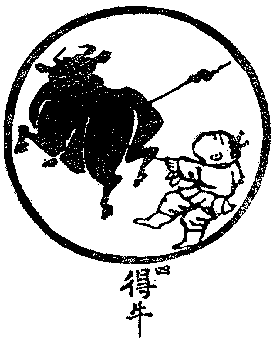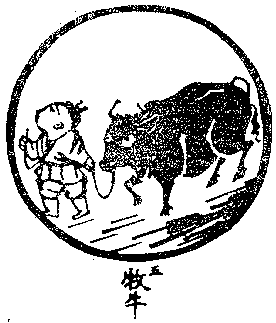Catching the Ox

I seize him with a terrific struggle.
His great will and power are inexhaustible.
He charges to the high plateau far above the cloud-mists,
Or in an impenetrable ravine he stands.
holding onto desire
I woke up this morning with the remnants of a dream left rattling in my head. By now, I've forgotten most of the plot, but I know that in the dream, there was apple juice and there was Katie. Those two things were stuck in my mind, and I awoke with a strong desire for Katie (not so much for apple juice). Even though I had no idea what to say or expect, I felt that I should contact her somehow. I had made the great mistake in believing that my thoughts were real — that the dream meant something significant. This feeling of wanting to hold onto the dream persisted briefly before I could break the grasp and label the desire.
See, the flip side of not holding onto anger and negative emotions is that it leads one not to hold onto pleasurable emotions, either. Most people would be happy to find a way to minimize anger, but if asked to let go of pleasure, they'd refuse. Who doesn't want to feel pleasure for as long as possible? In truth, we all want to hold onto our emotions (even anger) because they make us feel real, and they feed the ego. "If I'm feeling all this pain, I must exist." or "I'm so in love with Sally. I just want to remember this feeling forever!" Unfortunately, trying to solidify our fleeting thoughts never works out in the end. Something comes up to shatter our illusions of happiness, or something happens to prove that we're not so depressed or angry as we'd like to believe. Still, if given the choice, we would want to throw away the "bad" thoughts and emotions while holding tightly to the happy stuff — dreams of white picket fences and financial success, the pride of accomplishment, the memory of a wild party, or even the desire for a long-lost love. It's hard to let go of all of these thoughts when we want so desperately to believe that the thoughts matter.
So there I was, clinging to this desire for Katie while observing the desire as an illusion of the mind. As much as I wanted to hold onto the desire, just observing it made it fade away for a time. This wasn't such a debilitating or dramatic conflict in my head, though. I still had to eat lunch, after all. After a burrito in Harvard Square, I strolled by the river, where the thoughts returned, with a little less desire. "OK, it may be silly to want somebody in this way, but it would be nice to talk to her, to catch up and see that she's still alive." Of course, this fooling of myself won the battle, and I called, leaving an awkward voicemail message about the dream that I couldn't remember. "Ah, see? That was easy. Now I can just forget about it and enjoy the sunny day!" There were cormorants diving for fish in the Charles — a seemingly impressive feat. I felt a strong westward breeze, blowing against the river's current. The shrubs near the shore had been pruned almost to the ground, branches sliced cleanly across. But while I was walking and seeing all of these fascinating early-spring phenomena, every once in a while the thought would pop up: "hmm, will she call back? What would I say? Would she be glad to hear from me?" Walking, thinking, observing the thought, watching it fade. Wash, rinse, repeat.
On my way back home, Katie called. I hadn't seen her face on my phone for more than a year. We talked for a bit and caught up on some of the past year. Naturally, the experience fell far short of my wildest imagination — she wasn't rushing to come see me or even inviting me into her life. It was just a slightly uncomfortable, bittersweet but good-natured conversation. I was genuinely glad to hear her voice again.
But man, desire is a feisty one. Never underestimate the mind's ability to trick itself. This time, I could see the thought process as it was happening, and I came away unscathed while learning a bit more about this ol' ox of mine. But how many times in the past have I gotten caught up in desire? How many unwise decisions have I made as a result? More importantly, what happens the next time I dream about Katie?
doing nothing
My 26th birthday passed a couple of weeks ago, an occasion for looking backward, forward, sideways, and all that jazz. I thought about how some of my habits are not so different than they were 10 years ago. As a kid, I used to ride my bike to a particularly quiet four-way intersection and just sit there for ages, thinking. I'd just sit on the seat and maybe put my head on the handle bars. Thinking, thinking, thinking, rolling back and forth. Other times, I'd go to a busy intersection and watch the cars go by, trying to catch a glimpse of the drivers' faces. Or I'd spend an afternoon sitting on our front porch, looking outside, even when the porch was filled with junk, cramping my legs. Once, while I was watching cars, some neighborhood kids invited me to play. They'd seen me there for days and thought I could use some friends. We struck up a friendship that lasted for a while, but ultimately, we were going in different directions — who needs video games and bike tricks when there are so many things to think about at that intersection?
These days, I have many more places to go to watch cars and people, and there are tons of places to sit and think or just sit. In warmer weather, I walk up and down Mass. Ave. from MIT to Harvard. Sometimes I'll walk through Central Square maybe a dozen times. The funny thing is that I don't think anybody notices the strange guy who keeps going back and forth down the street. I can't blame them — there's a lot of weird stuff happening in Central Square, and if you paid attention to it all, you'd never get to where you're going.
Lately, I've been following blind people. It still amazes me how blind people are able to survive in the city without getting run over by a car, walking into a construction site, or becoming hopelessly lost. So, I follow them around in an effort to see how it's possible. Also, I have this idea that if they need help crossing the street or finding their way, I should be near by because, hey, I'm not doing anything more important. But those blind folks really don't need my help. It's amazing. One day, I'm going to try walking around blindfolded with a walking stick, just to see how far I can get. That might be the last thing I do.
Anyway, the point is that over time, I've come to grips with this idea of "doing nothing." There was also a period in my life when I thought that I needed to be doing something lest I become bored. Being bored was the worst thing in the world, and I'd become cranky and restless when I was bored. Being bored is no problem — boredom is life. Also, people who say they're bored often really mean they're lonely or sad, or they simply don't want to face their own thoughts. But if you're at peace with yourself and not afraid of any thoughts that might arise, boredom is no big deal; it doesn't even exist.
To me, doing nothing doesn't mean tuning out or taking a vacation from life. If I'm sitting around idly browsing the web (as I did for part of the day today) or watching T.V., that's not a great way of doing nothing. That's atrophy. Napping? Action movies? Atrophy. Doing nothing means not needing to perform some activity. Maybe you're just looking at birds, sitting on a chair, or walking around. There's no goal, but you're fully engaged in no-goal. In those times of wandering, you can gain all sorts of insights, maybe have a eureka moment or two. People who always wear headphones or whip out a book on the subway are kind of shutting out the world; they can't seem to sit still without needing to plug in or consume content. Reading Harry Potter on the T won't help you understand who the hell you are; to do that, shut the book, look out the window at the wall of the tunnel, notice the people around you, and feel the tracks beneath your feet.
This story wouldn't relate to the theme if not for the ox rearing his head. The ox that dances while I "do nothing" is the day-dreaming ox or the judging ox. When I'm walking through Cambridge, it can be hard just to walk without following trains of thought — "Oh, a book store / I should buy a book / what about that story in the Times about local book stores? / old books smell like dust / dust makes me sneeze." Or even worse, if I'm busy mentally undressing every beautiful woman who passes me, well, I'm not exactly living in the moment. The imagination is a powerful thing, requiring lots of taming before it stops interfering with a perfectly good walk to nowhere. And so I have to catch myself and watch out for these unhelpful thoughts. "No, that guy is not necessarily a douche-bag; he's just a guy who happens to have a popped collar. Keep walking!"
This effort is a great challenge, especially in the city, where the senses can become overloaded. It's a challenge I'm definitely struggling with, but it's necessary to tame the ox before riding him home and forgetting all about him.

The whip and rope are necessary,
Else he might stray off down some dusty road.
Being well trained, he becomes naturally gentle.
Then, unfettered, he obeys his master.